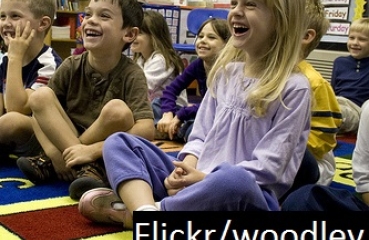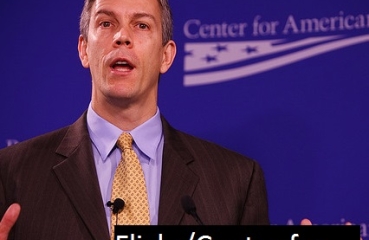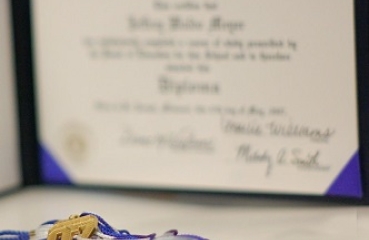What's right about Common Core
Robert PondiscioI confess I’m somewhat bewildered by the passionate arguments over the Common Core State Standards. Getting in high dudgeon about K–12 learning standards, which say almost nothing about what kids do in school all day, makes no more sense to me than getting apoplectic about food-handling procedures, which I seldom think about when pushing my cart through the grocery store.
Arne Duncan's Office of Civil Rights: Six years of meddling
Michael J. PetrilliAt war with the “loose” part of “tight-loose” federalism. Michael J. Petrilli
In defense of annual testing
Testing works. Federal intrusiveness and poorly designed interventions are the real problem. Andy Smarick
The new Education Trust report: The triumph of hope over experience
Michael J. PetrilliThe Education Trust has a proud and distinguished history. When the group got its start in the mid-1990s, achievement for poor and minority children was lagging, and the education policy community largely ignored their needs. Ed Trust changed all that with a single-minded focus on equity, hitched to the relatively new notion of school-level accountability.
Late Bell: October 9, 2014
Thomas B. Fordham InstituteSTART SPREADING THE NEWSGreat news for students at underperforming district schools in New York City: On Wednesday, the Empire State
No Struggle No Progress: A Warrior's Life from Black Power to Education Reform
Ellen AlpaughLessons from a legend. Ellen Alpaugh
The Cognitive Science Behind the Common Core
Robert PondiscioAnalysts are half-right. Robert Pondiscio
Common Core State Standards in 2014: Districts' Perceptions, Progress, and Challenges
Victoria McDougaldA worm’s-eye view of implementation. Victoria Sears
Late Bell: October 8, 2014
Thomas B. Fordham InstituteNEW PRESIDENT FOR STUDENTSFIRSTJim Blew of the Walton Foundation will take over the helm of the advocacy group StudentsFirst after the resignation of founder Michelle Rhee, who announced she was stepping down two months ago.
Howls of protest? Check!
In a recent EdNext column, Checker Finn proposed what he expected to be a controversial solution to the problem of low levels of college readiness among our high school graduates: namely, “different ways of completing—and being credentialed for completing—one’s primary and secondary education.”
Ed reform's blind spot: Catholic schools and social capital
[Editor’s note: This is the fifth in a series of personal reflections on the current state of education reform and contemporary conservatism by Andy Smarick, a Bernard Lee Schwartz senior policy fellow with the Thomas B.
Late Bell: October 6, 2014
Thomas B. Fordham InstituteWelcome to the new-and-improved Late Bell, Fordham's uncanny afternoon newsletter! We're starting off our bold new era with a special Fordham-in-the-news edition.
Time for a Reboot
Chester E. Finn, Jr.Ed reform is dead. Long live ed reform. Chester E. Finn, Jr.
Character strengths can be taught
As the founder and Executive Director of KIPP Philadelphia Schools, I was surprised to read Dr. Laurence Steinberg’s Flypaper post on how KIPP charter schools approach character development. In response to his portrayal of our character work, I want to offer a KIPP educator’s perspective.
VIDEO: The Health of the Public Charter School Movement: A State-by-State Analysis
Twenty-six state-by-state rankings of charter school quality, growth, and innovation.
New OCR guidance on equitable resources: A godsend for charter schools?
Michael J. PetrilliOn the whole, the new guidance from the U.S.
The Health of the Public Charter School Movement: A State-By-State Analysis
Megan LailSome good results, but there’s work to be done everywhere. Megan Lail
How to kill reading achievement
Robert PondiscioThere’s more to Common Core than “close reading.” Robert Pondiscio
In the Common Core era, different kids need different credentials
Chester E. Finn, Jr.We need two kinds of high school diplomas. Chester E. Finn, Jr.
District school authorizers and next-generation accountability
I’m excited about a recent shift in the reform conversation. After years of focusing on Common Core, common assessments, and teacher evaluation, many of those interested in large-scale K–12 improvements are turning their attention back to state accountability systems.
The one question that should determine NCLB waiver renewals
As a premed student in college, I grew accustomed to being evaluated on just a handful of marks—two midterms and a final exam made up the entire grade. With so few assignments, the stakes to do well on each test were high. But there were a couple of professors who upped the ante even more. They’d toss out your shoddy midterm grades if you aced the final, no questions asked.













